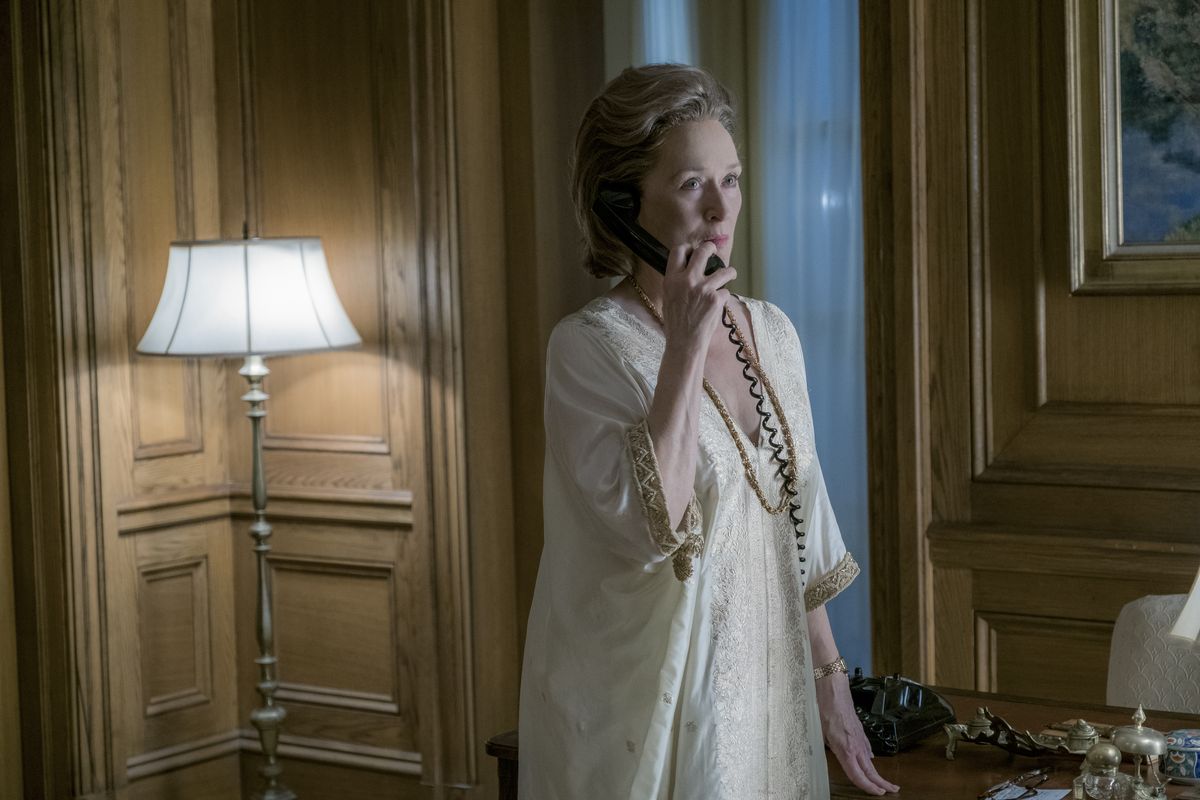
MPAA Rating: PG-13 | Rating: ★★★½
Release year: 2017
Genre: Biography, Drama, History Director: Steven Spielberg
The Post manages to make copy editing feel suspenseful and exciting. This is an accomplishment worth celebrating, as a film about the behind-the-scenes machinations of professional journalism and American politics could easily become stodgy or elitist. It also reveals its intent to celebrate the merits of the writing professions as a whole and journalism in particular. In this, The Post may rightfully garner comparisons to Oscar Best Picture-winner Spotlight, as both are filmic interpretations of real-life events in major newspapers which dramatically impacted American institutions in recent memory. Yet where Spotlight is about the painstaking efforts of long-term investigative journalism, The Post is a breezy, at-times frantic story about the significance of the free press and its influence within American history. Where Spotlight highlighted the risk of patience and waiting, The Post is about the risk of urgency, what happens when one has waited long enough.
The Post follows two central characters, Kay Graham (Meryl Streep) and Ben Bradlee (Tom Hanks), over the course of a week in 1971, when the Washington Post obtained classified papers from the Pentagon which revealed the government’s knowledge (and subsequent cover-up) of the failure of the Vietnam War. As the paper goes public on the stock exchange, its leaders must also decide whether to go public with the papers. With President Nixon breathing threats and having put a temporary hold on the New York Times’ publication of the same papers, Graham and Bradlee need to make a decision, as Post reporters, investors, lawyers, and board members all offering their perspectives.
A biopic about 1970s journalism may not seem like a typical move for Steven Spielberg. Sure, he’s made historical dramas before (Amistad, Munich, Schindler’s List, Lincoln, Bridge of Spies). Yet a relatively recent event about a newspaper room may not sound like it’d fit Spielberg’s fantastical action-oriented aesthetic. A journalist’s life can be frantic and full of tension and anxiety, but it’s also often a daily grind of typing, editing, printing, and so forth. Still, Spielberg gives us a picture of just how suspenseful and tense these few days were for Graham and Bradlee, as their decision about whether to publish could have meants the loss of the paper or prison. Yet the freedom of speech and holding one’s government officials accountable were also on the line. As various characters overtly point out in various moments, this decision was not just about the paper, but about the principles behind the paper.
That this significant decision is made by a woman is just as significant. A phone call between Graham and her cadre of advisors is one of the best scenes of the year due to Streep’s deliberately subtle acting and Spielberg’s masterful direction and editing. Through posture of the actors and the framing of the camera, it creates a sincere sense of weightiness and suspense–even if we can guess the outcome, it’s still a remarkably tense scene. It shows Graham at her finest, making a costly decision without bravado or the need for recognition. There’s also a late scene–a bit on the nose–where Graham humbly walks down the steps of the Supreme Court as a crowd of women look upon her in awe. A few pointed moments like this feel obvious, but these Spielbergian flourishes are easily forgivable when the point still apparently needs to be made in 2017.
The Post runs like clockwork. Streep, Hanks, and Spielberg make film-making appear effortless. The two actors dissolve and disappear into their characters perfectly as the director frames the scene with a fluid precision, the camera moving exactly when it needs to while remaining focused when it doesn’t. Streep is especially great here, portraying Graham as a quietly insecure woman who learns how to use her voice over the course of the film. The supporting cast–Sarah Paulson, Bob Odenkirk, David Cross, Alison Brie, Bradley Whitford, Carrie Coon, Jessie Plemons, Matthew Rhys, and Bruce Greenwood–are each proficient in their respective roles, making this one of the best acting ensembles from 2017. Still, it comes back to the direction here. While its nowhere near as ambitious as, say, A.I. or Saving Private Ryan, this is not “minor” Spielberg. I’m not sure Spielberg really makes anything “minor.”
Late in The Post, Odenkirk’s character tells Bradlee that he always wanted to be part of a small revolution. When the film ended, my wife turned to me and said, “At least there’s hope.” She was referring to the present-day antagonism between the American government and the press. Over 40 years ago, a newspaper held the presidency accountable for the President’s lies and lack of integrity. In this era of “Fake News” and another deceitful presidency, the significance of telling the truth seems more weighty and hopeful than ever. To tell the truth, to shine light into the darkness, may inspire liberation.
IMDB Listing: http://www.imdb.com/title/tt6294822/
Leave a Reply